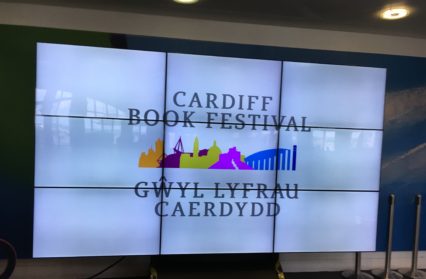Rachel Carney was Wales Arts Review’s woman on the ground at the inaugural Cardiff Book Festival.
It seems appropriate that, in the same year in which Cardiff held its first ever city-wide arts spectacular in honour of Roald Dahl, the first Cardiff Book Festival also takes place. Almost every town or city now has an annual celebration of all things lit, so it seems strange that, up until now, the capital of Wales has not had a book festival of its own bearing the city’s name. Sparked by an idea from organisers Cerith Mathias, Brian Meechan and Anna Day, the Cardiff Book Festival is a much needed addition to a city which thrives on culture, diversity and the arts.
The programme was varied, with something for everyone, a kind of Hay Festival in miniature form. It included everything from a Scrabble tournament to political debate, but the main focus was on literature, with a strong contingent of Welsh writers including Owen Sheers, Jonathan Edwards and this year’s Wales Book of the Year-winner, Thomas Morris. Those from further afield included thriller writer Sophie Hannah, London-based poet Caroline Smith, and journalist Miranda Sawyer.
The highlights of a book festival are often the little nuggets of insight that you get from hearing writers discuss their work, and Cardiff Book Festival was full of such insights. There were fascinating conversations about form, genre, inspiration and the complexities and challenges of the writing process.
Many writers spoke about the aches and pains of redrafting their work. Laura Powell began her debut novel, The Unforgotten (Hesperus Nova, 2015), as an old-fashioned story of forbidden love, but admitted that she was influenced by watching TV crime dramas, so that it became “an accidental thriller” from which she eventually cut 50,00 words.
There was an interesting discussion about the ethical issues involved in writing of “other people’s traumas”. Holly Müller, whose book, My Own Dear Brother (Bloomsbury, 2016), is set in Austria during the Second World War, explained that she was forced to abandon her preconceptions when interviewing elderly Austrians, and needed to be bold in producing a book which would portray the reality of that time. Patrick McGuinness, who lived in Bucharest for over a year during the Ceauşescu regime, wrote his novel, The Last Hundred Days (Seren, 2011), from the perspective of an outsider, someone who, like him, was able to observe what was going on, but from a safe, uninvolved vantage point. He described how some Romanians were critical of his work, even though contemporary Romanian literature still avoids the subject.
It was pointed out by Cynan Jones that festivals show “there is no one way to write”. Sophie Hannah described her writing process as being full of “torment and despair”, while Deborah Moggach argued that “there’s no such thing as plot, only character”. Rachel Tresize revealed that, whilst it takes her just a week to write a short story, her novel took seven years to complete, and Thomas Morris described spending three weeks working on the final paragraph of one story, determined to get it “just right”.
Alongside traditional meet-the-author events, there were writing workshops, the most interesting of which provided an insight into the publishing world. Hazel Cushion, from Accent Press, and Richard Davies, from Parthian, gave encouraging, though somewhat contradictory advice, and Gary Raymond described his own journey towards publication.
The festival concluded with a lively debate on whether we still need feminism in 2016. The overwhelming conclusion was “yes”, perhaps due to the fact that the five women on stage were all feminists. The festival organisers did a fantastic job of bringing writers and thinkers together to discuss the best of UK literature, and the only question that remains is this: will the Cardiff Book Festival of 2016 be the first of many more to come? I very much hope that the answer will be a resounding “yes”.
Rachel Carney is a blogger on all things books – www.createdtoread.com











